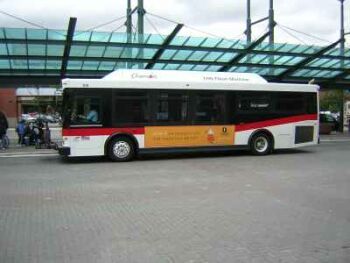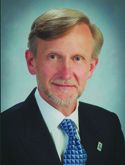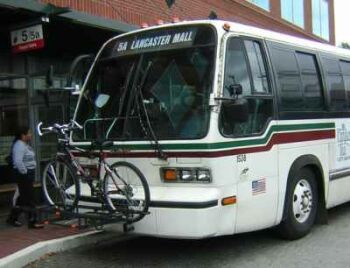
Publisher:
Bonnie King
CONTACT:
Newsroom@Salem-news.com
Advertising:
Adsales@Salem-news.com

~Truth~
~Justice~
~Peace~
TJP
Jun-14-2011 12:30

 TweetFollow @OregonNews
TweetFollow @OregonNews
New Report: Aging Baby Boomers will face Poor Mobility Options
Salem-News.comIn four years, over half of seniors in the Salem region will have poor access to transit...
 The bus building in the background has been closed over failing construction which is another costly question. KATU/Salem-News.com photo by Tim King. |
(SALEM, Ore.) - Forward by editor: Salem, Oregon is a unique city with a particular, challenging problem for working residents with weekend schedules. Public transportation officials have elected to terminate weekend bus service in Oregon's capitol city. Other American cities and towns smaller in size maintain these essential services for the disabled and for those who simply rely on public transportation, but Salem does not. I am glad to see the release of this study and hopefully it will lead to more expanded thinking in this important area. - Tim King
By 2015, more than 15.5 million Americans ages 65 and older will live in communities where public transportation service is poor or non-existent, a new study shows.
That number is expected to continue to grow rapidly as the baby boom generation “ages in place” in suburbs and exurbs with few mobility options for those who do not drive. The Salem metro region ranked 55 (1 being the worst) amongst 81 metropolitan areas of 250,000 to one million people for the percentage of older Americans with poor access to transit.
The report, Aging in Place, Stuck without Options, ranked metro areas by the percentage of seniors with poor access to public transportation in the coming years and presents other data on aging and transportation.
The analysis by the Center for Neighborhood Technology evaluates metro areas within each of five size categories. It shows that in just four years, 53 percent of older residents, 26,440 people, in the Salem metropolitan region – defined by the U.S. Census – will live in neighborhoods with poor access to options other than driving. These conditions present a daunting challenge to local communities as a larger share of their population demands increased mobility options.
Salem’s size category also included the Eugene-Springfield metropolitan region, which ranked 69 with 39 percent of older adults lacking quality transit. In Hamilton, OH, 100 percent of seniors will live without access to public transportation.
Portland ranked 29 out of 46 metro regions of one to three million people. Over 141,000 older adults, half of all adults over 65, will lack access to quality transit in 2015. This is a 70 percent increase since 2000 according to Transportation For America. Kansas City ranked worst in Portland’s size category. Metro Atlanta ranked the worst for large metros with populations over 3 million.
 John Robert Smith |
“The baby boom generation grew up and reared their own children in communities that, for the first time in human history, were built on the assumption that everyone would be able to drive an automobile,” said John Robert Smith, president and CEO of Reconnecting America and co-chair of Transportation for America. “What happens when people in this largest generation ever, with the longest predicted lifespan ever, outlive their ability to drive for everything? That’s one of the questions we set out to answer in this report.”
“Older Oregonians have special mobility needs. As we age, many older Americans stop driving and need other ways to get around,” said Jerry Cohen AARP Oregon State Director. “As the biggest generation turns 65, more Americans than ever before will learn firsthand that there are inadequate transportation options.”
“Cherriots works hard to provide fixed-route transit that older adults can easily use,” said Salem-Keizer Transit General Manager Allan Pollock. “Paratransit trips are critical and will always be needed to serve customers who cannot access the fixed-route service, but they do cost more to provide per ride. If we invest in fixed-route transit that more seniors and mobility-impaired individuals can use, we’ll save on paratransit costs and serve all of our customers better. Ultimately, we need to adequately fund both fixed-route service and paratransit to meet the challenge of an aging population, provide mobility options for everyone, and improve the livability of the Salem-Keizer region.”
Without access to affordable travel options, seniors age 65 and older who no longer drive make 15 percent fewer trips to the doctor, 59 percent fewer trips to shop or eat out, and 65 percent fewer trips to visit friends and family, than drivers of the same age, research shows. As the cost of owning and fuelling a vehicle rises, many older Americans who can still drive nonetheless will be looking for lower-cost options.
 |
“The transportation issues of an aging America are national in scope, and cash-strapped state and local governments will be looking for federal support in meeting their needs,” Smith added. As Congress prepares this summer to adopt a new, long-term transportation authorization, Aging in Place, Stuck without Options outlines policies to help ensure that older Americans can remain mobile, active and independent:
Increase funding support for communities looking to improve service such as buses, trains, vanpools, paratransit and ridesharing;
Provide funding and incentives for transit operators, nonprofit organizations, and local communities to engage in innovative practices;
Encourage state departments of transportation, metropolitan planning organizations, and transit operators to involve seniors and the community stakeholders in developing plans for meeting the mobility needs of older adults;
Ensure that state departments of transportation retain their authority to “flex” a portion of highway funds for transit projects and programs;
Include a “complete streets” policy to ensure that streets and intersections around transit stops are safe and inviting for seniors.
To view the full report and to see the extended rankings, please click here.
TRANSPORTATION FOR AMERICA (T4) is the largest, most diverse coalition working on transportation reform today. Our nation’s transportation network is based on a policy that has not been significantly updated since the 1950’s. We believe it is time for a bold new vision — transportation that guarantees our freedom to move however we choose and leads to a stronger economy, greater energy security, cleaner environment, nd healthier America for all of us. We’re calling for more responsible investment of our federal tax dollars to create a safer, cleaner, smarter transportation system that works for everyone. www.t4america.org
--
Articles for June 13, 2011 | Articles for June 14, 2011 | Articles for June 15, 2011

Quick Links
DINING
Willamette UniversityGoudy Commons Cafe
Dine on the Queen
Willamette Queen Sternwheeler
MUST SEE SALEM
Oregon Capitol ToursCapitol History Gateway
Willamette River Ride
Willamette Queen Sternwheeler
Historic Home Tours:
Deepwood Museum
The Bush House
Gaiety Hollow Garden
AUCTIONS - APPRAISALS
Auction Masters & AppraisalsCONSTRUCTION SERVICES
Roofing and ContractingSheridan, Ore.
ONLINE SHOPPING
Special Occasion DressesAdvertise with Salem-News
Contact:AdSales@Salem-News.com



Terms of Service | Privacy Policy
All comments and messages are approved by people and self promotional links or unacceptable comments are denied.
[Return to Top]
©2026 Salem-News.com. All opinions expressed in this article are those of the author and do not necessarily reflect those of Salem-News.com.